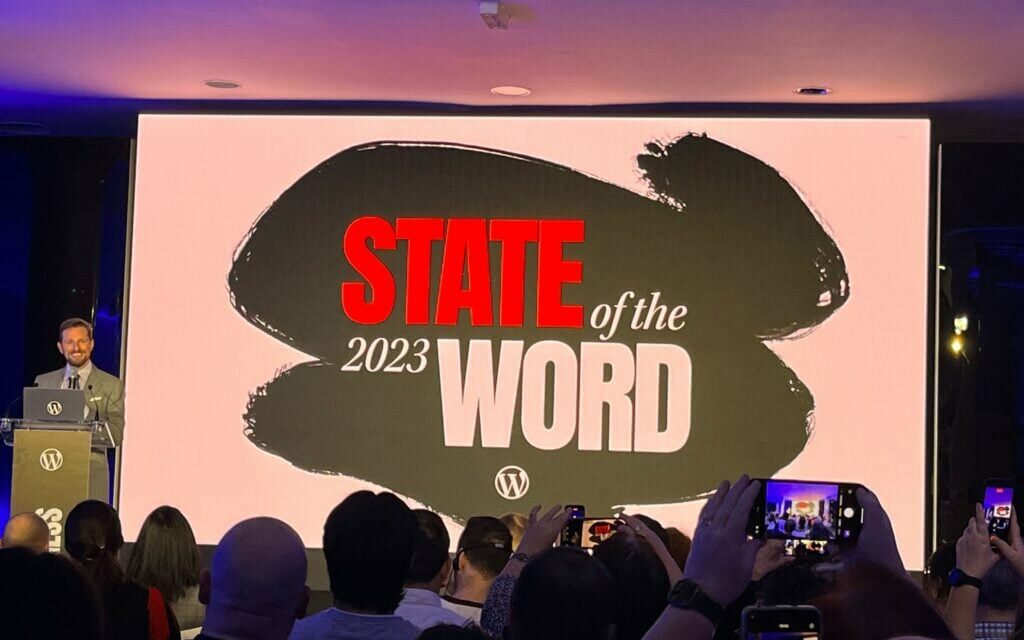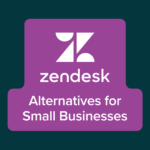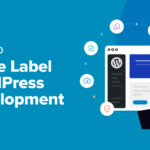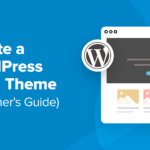WordPress Co-Founder Matt Mullenweg delivered his 2023 State of the Word from Madrid, Spain on Monday, marking the first-ever international delivery of his annual keynote address.
Streamed worldwide, the event offered a comprehensive view of WordPress’s 2023 milestones and accomplishments, as well as the exciting prospects awaiting WordPress users in 2024.
Some of the biggest takeaways from this year’s presentation included significant progress with regard to collaborative editing features in upcoming versions of WordPress, performance enhancements for faster site-building experiences, and the announcement of Portland, Oregon as the host city for WordCamp US for the next two years.
Check out this year’s State of the Word in its entirety below, or read on for our detailed recap!
Celebrating Two Decades of WordPress
2023 marked a significant milestone for WordPress, as the CMS celebrated its 20th anniversary on May 27.
Reflecting on this journey, Mullenweg highlighted the transformation of WordPress from its humble beginnings as a blogging tool to a comprehensive framework that now powers more than a third of all websites worldwide.
WordPress Co-Founder Matt Mullenweg delivers his 2023 State of the Word keynote address from Madrid, Spain.
The global WordPress community actively participated in this milestone year, and as WordPress users were celebrating around the world, community participation surged. 2023 saw 70 WordCamps (more than double the previous year’s number) held in 33 countries, with the next major WordCamp, WordCamp Asia, scheduled for March 7–9 in Taipei, Taiwan.
Adding to the celebratory spirit, the WordPress community also welcomed 1,339 new contributors in 2023. This integration of new minds and ideas was not only a fitting way to mark the 20th anniversary, it also sets a promising path for WordPress’s future advancements and collaborations.
New Developments and Features
In addition to those exciting updates, Mullenweg also detailed several noteworthy new features and advancements to existing projects within the WordPress ecosystem.
Staying in line with the topic of events, Mullenweg noted the presence of a new “Nearby Events” widget now visible in the WordPress Admin dashboard, which, using geolocation, aims to foster wider community engagement by displaying upcoming WordPress events in a user’s vicinity.
Mullenweg also announced the re-launch of the WordPress Showcase, which highlights high-performing WordPress sites and serves as a testament to WordPress’s scalability and security.
“I find this as the most effective antidote when you meet someone who asks, can WordPress scale? Is it secure? Can it grow?” Mullenweg said.
“Well, it turns out it can scale enough to handle Swifties, as we saw the other day, where time.com named Taylor Swift the Person of the Year and at their peak they were serving over 100,000 requests per second.”
Additional new features and developments Mullenweg highlighted included a new /remembers page on wordpress.org, dedicated to the memory of WordPress community members who have passed away.
He also provided an update on the Openverse project, which aims to index all the open licensed content in the world, and which recently won the Open Education Award for Excellence in Open Infrastructure.
The WordPress Playground
Another area where Mullenweg offered new updates and developments was around the WordPress Playground project, which was officially launched during last year’s State of the Word.
Touted as a “WordPress experience running entirely in your browser,” WordPress Playground enables users to experiment with their site—including plugins, designs, updates, and more—without needing a web host, database, or web server.
Accessible through the WP Admin with no additional sign-up or setup, it’s ideal for both WordPress newcomers exploring the CMS and experienced users testing new plugins risk-free.
Recent updates to WordPress Playground have introduced features for direct code interaction in tutorials (upcoming Editor Block), information retention in-browser (via web workers), added PHP extensions (libxml, mbstring, iconv, gd), and network access for API interactions and plugin browsing.
Users can now run various WordPress versions, including nightly builds, test specific GitHub Gutenberg Pull Requests (WordPress Pull Request Previewer), sync locally for plugin development, and utilize Blueprints Builder functionality.
Twenty Twenty-Four
Mullenweg also spoke about the most recent default WordPress theme, Twenty Twenty-Four and a few of the (many) accolades this theme has already won from WordPress users.
Mullenweg presents feedback regarding the new Twenty Twenty-Four WordPress theme at State of the Word 2024
Demonstrating the advancements of Gutenberg’s Phase 2, Twenty Twenty Four incorporates over 35 built-in patterns, showcasing WordPress’s versatility.
“It really can meet the needs of anyone—whether you’re an artist, entrepreneur, or prolific writer,” Mullenweg said of the new theme.
“It’s the first [WordPress theme] to take advantage of the full powers of Gutenberg and show what can be done, so I hope this inspires many, many other things being built.”
You can find a detailed review of the Twenty Twenty-Four theme here.
Gutenberg’s Progress
Speaking of Gutenberg, Mullenweg also revisited the Gutenberg roadmap, first launched alongside WordPress 5.0 in 2018, emphasizing its four-phase development:
Phase 1: Editing
Phase 2: Customization
Phase 3: Collaboration (current)
Phase 4: Multilingual capabilities (upcoming)
Gutenberg Lead Architect, Matías Ventura, then took center stage to further discuss Gutenberg’s progress and future plans. Delving into the third phase of Gutenberg, Ventura emphasized Gutenberg’s dual functionality as a writing and design tool, noting advancements in the following areas:
Enhancements in Collaboration and Workflow
Given the name of Gutenberg Phase 3 is “Collaboration,” one of the most exciting developments Ventura discussed was the introduction of collaborative editing functionality. This feature is set to revolutionize how users interact with Gutenberg, allowing for real-time collaboration directly within the editor.
Ventura showcased a prototype of this feature and invited the WordPress community to participate in its testing through the Gutenberg plugin, welcoming feedback via GitHub. He candidly noted the initial bugs in this early version but emphasized the importance of community feedback for refining the tool.
“It’s going to be buggy,” he said, “but we want to get as much feedback as possible, so we can figure out all of these approaches.”
Site Editor and Patterns
Ventura also noted several improvements to the Site Editor and Site Editor Patterns with a focus on streamlining workflows and utilizing patterns more effectively.
- Interactions within the Site Editor have been made more intuitive. For example, linking blocks to custom fields has been streamlined, simplifying the process of tailoring site elements to specific needs.
- A new “Zoom Out” mode has been introduced, offering users a comprehensive view of their site’s structure. This mode not only offers a bird’s-eye view of patterns but also contextualizes them within the larger site structure, aiding in more informed design decisions.
- The concept of “pattern swapping” has been introduced, allowing for seamless exchanges between different but semantically related patterns.
- Theme JSON files can now be applied to specific patterns, granting developers and designers more control while maintaining flexibility for pattern customization. The ability to swap patterns and apply theme JSON files to specific patterns empowers developers and designers to set precise guidelines for clients while still allowing them some creative leeway.
- The merging of global design control with localized content customization has been achieved through enhanced pattern functionalities. This development represents a significant leap in content management, bridging the gap between overarching site design and individual content elements.
Another innovative feature is the concept of partially-synched patterns. This allows editors to modify content within a pattern, while designers and developers can update the design elements of these patterns without affecting the content changes already made.
This feature is a game-changer in balancing control between content creators and designers, ensuring cohesive site aesthetics while maintaining content dynamism.
In sum, these developments mark a significant milestone in the evolution of Gutenberg, demonstrating WordPress’s commitment to continual improvement and innovation in website creation and management.
Performance Upgrades
Ventura also emphasized his team’s commitment to enhancing performance of the editor itself and for end-users. The goal, he said, was to ensure a fast and responsive experience for both content creators and website visitors.
In that vein, significant improvements have been made in the editor’s performance and the front-end user experience, aiming to optimize speed and accessibility. Ventura highlighted the development of a dashboard that monitors basic operations such as typing speed, ensuring these features remain fast even as new ones are added.
Gutenberg Lead Architect Matías Ventura presents a slide showing the editor’s back-end speed getting 2x faster with WordPress version 6.4 and potentially 3x faster with 6.5.
The results are evident: testing shows that the editor’s back-end speed has doubled with WordPress version 6.4 and is projected to triple with version 6.5. These advancements in performance demonstrate the Gutenberg team’s dedication to delivering a faster, more efficient user experience across WordPress websites.
Data Liberation
Mullenweg returned to the stage to announce an exciting new initiative focused on “Data Liberation,” centered around giving users complete ownership and control over their data and facilitating easier transitions from various platforms to WordPress.
The core of this initiative is a series of guides, also referred to as “moderation frameworks,” designed to help everyday users seamlessly migrate their data to WordPress. These guides cover a range of platforms, offering practical steps for data transfer.
Mullenweg highlighted the development of user-friendly features such as one-click migrations, simplified exports, and export formats. He also addressed the long-standing challenge of preserving rich-text formatting during copy-paste operations, ensuring a smoother transition process.
This new direction not only showcases WordPress’s dedication to user empowerment but also reflects a strategic shift towards more agile and responsive project management. With Data Liberation, WordPress is set to offer its users an unprecedented level of control and ease in managing their digital content.
AI Integration
Highlighting 2023 as a pivotal year for AI in WordPress, Mullenweg encouraged the exploration of AI tools, such as CoPilot, and showcased the integration of AI with WordPress Playground for creating complex websites using natural language processing.
Using ChatGPT to create a site with Playground Blueprints, Mullenweg provided a practical example: “Create a Woo site for a shoe shop, with SEO tools and some contact form solution. Title it ‘Hola, Madrid’.”
Impressively, Playground used the prompts to quickly create a WordPress site with WooCommerce and other relevant plugins, demonstrating the power of AI in streamlining website development.
Mullenweg also advised attendees to “Learn AI deeply,” noting that with its ongoing advancements, WordPress isn’t just keeping pace with the AI revolution but actively shaping how AI can be leveraged for more intuitive, efficient website creation and customization.
Indeed, 2023 already stands out as the year in which AI became an integral part of the WordPress experience, opening new possibilities for users and developers alike.
WordCamp US Heads to Portland!
Towards the end of the presentation, Mullenweg dropped the final reveal of this year’s State of the Word with the announcement that Portland, Oregon, will host WordCamp US for the next two years.
The much-anticipated event is set to take place at the Oregon Convention Center from September 17-20, 2024, and the news was warmly received by attendees.
The choice of location reflects the event’s continued commitment to bringing together the diverse and dynamic WordPress community in unique and inspiring settings. Portland, known for its creative and tech-savvy culture, promises to be an ideal backdrop for the exchange of ideas, learning, and collaboration that WordCamp US is celebrated for.
Looking Ahead: A New Era for WordPress
As WordPress embarks on its third decade, the revelations from the State of the Word 2023 not only validated past achievements but also paved the way for an exciting future ahead. This year’s presentation, which featured its familiar blend of reflection and foresight, underscored WordPress’s unwavering commitment to innovation, community engagement, and user-centric development.
Advancements in collaborative editing, performance upgrades, and the embrace of AI represent more than just technical progress; they signal a shift towards a more intuitive, efficient, and inclusive web experience. The announcement of Portland as the next host for WordCamp US adds to this momentum, promising new opportunities for learning, networking, and community building.
But what stands out most from this year’s State of the Word is the clear vision for a WordPress ecosystem that is not only more connected and efficient but also more accessible and empowering for its users.
Whether you’re a long-time WordPress enthusiast or a newcomer to this vibrant community, the horizon is bright with possibilities. In the years to come, we can expect WordPress to continue setting new standards and nurturing a digital landscape where creativity and collaboration thrive.
















